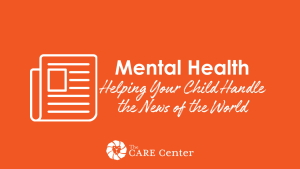Providing Hope: It’s Time to Open the Door for Mental Health Conversations with Children
In the United States, approximately 2.7 million children aged 3-17 experienced feelings of depression (CDC, 2019). May is Mental Health Awareness Month, a time dedicated to raising awareness and understanding about mental health issues. While much progress has been made in recent years in destigmatizing mental illness and promoting open conversations about mental health, one area that often gets overlooked is the importance of discussing mental health with children.
Mental Health Awareness Month serves as a reminder of the importance of prioritizing mental well-being. It’s not just about adults; mental health impacts individuals of all ages, including children. In 2020, it was estimated that 1 in 8 Oklahoma children between the ages of 3 and 17 experienced anxiety or depression (OKGOV, 2020). By addressing mental health early on, we can help children develop healthy coping mechanisms and support systems.
Many caregivers find it natural to identify a child’s physical needs: nutritious food, warm clothes when it’s cold, bedtime at a reasonable hour. However, a child’s mental and emotional needs may not be as obvious. Good mental health allows children to think clearly, develop socially and learn new skills.
“Having conversations about mental health helps to reduce the stigma associated with mental healthcare and can encourage kids to feel safe in seeking help,” says Hannah Griffis, Director of Mental health at The CARE Center..
Understanding Mental Health in Children
Defining mental health in children is the first step to understanding its significance. Mental health encompasses a child’s emotional, psychological, and social well-being. Unfortunately, there are many misconceptions and stigmas surrounding mental health, which can prevent children from receiving the support they need. Untreated mental health issues can have a profound impact on a child’s development, affecting their academic performance, relationships, and overall quality of life.
Children who are left with untreated emotional needs or mental health disorders may experience a number of roadblocks such as:
- Behavioral issues within a home setting
- Falling behind in school
- Trouble maintaining friendships with other children
- Obstacles in the way of reaching childhood developmental milestones
Practical Tips for Talking to Children About Mental Health
“Talking with kids about mental health in a way they can understand, but it also accurate can n help provide language and meaning to what children are feeling,” says Griffis.
Encourage empathy and understanding by teaching children to recognize and validate their emotions and those of others. Discussing the topic when a child feels comfortable sharing creates an open line of communication with the child. This ultimately creates a space where it is always okay for a child to speak-up about their mental well-being.
Who and Why
Caregivers – Play a crucial role in discussing mental health with their children at home. Caregivers can foster open communication by beginning the conversation on mental health.
Teachers and school administrators – Teachers and school administrators also play a vital role in creating a safe space for students to discuss mental health at school. Teachers and school administrators can encourage an “open door” policy for conversation on mental health. Even if a child is not struggling in the moment, provide them with resources for the future.
Advocates – Anyone and everyone should be an advocate for children’s mental health. Advocates can provide hope and support to children facing mental health challenges, reminding them that they are not alone. Being a listening ear and helping hand for a child could make a huge difference in their mental health.
Try these tips when discussing mental health with a child:
· Avoid words which perpetuate negative stereotypes such as, “crazy,” “psycho,” or “insane.”
· Avoid placing labels on a child. For instance, using terms such as “mental health condition” instead of “mental illness” helps to reduce negative connotations.
· Show grace and acceptance through the conversation.
Discussing mental health with children is essential for their overall well-being and development. As caregivers, educators, and advocates, we must continue to prioritize these conversations beyond Mental Health Awareness Month. By working together, we can provide hope and support to children struggling with mental health issues and help them lead happy and fulfilling lives.
For immediate mental health assistance call 988 or talk to someone now.
Caregivers, providing your child with the resources they need to battle mental health is important. Visit, the Parents Guide to Good Care to find resources near you that can aid your child in a better tomorrow.



